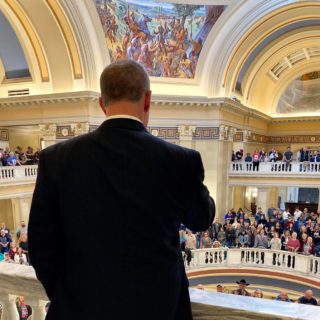There are 5 weeks left of session this year. Last week marked the passing of another deadline, and things are getting intense at Lincoln and 23rd . Tuesday the House didn’t let out until 10PM and Weds the Senate had its turn at a late night concluding at 11:30PM. Both nights floor sessions were interrupted by protestors. Tuesday a 2nd Amendment lobbying group and Weds the Collegiate Freedom Coalition were the disrupters. In response, Governor Stitt signed SB 403 making it illegal to disrupt government meetings. Anyone doing so could find themselves guilty of a misdemeanor facing up to a year in the county jail, a fine of up to $1,000, or both.
The legislature revealed new districting maps. Every ten years coinciding with the census, the legislature must redraw the district lines. There was a press conference where they discussed how they went about this process and asserted it was the most open and transparent redistricting in the history of our state. You can find the press conference here https://fb.watch/51UqUND0Vf/
And links to the proposed House and Senate districts here (House) https://bit.ly/3sLjDgF (Senate) https://bit.ly/3sJBjt8
$10 million was appropriated to create a new office under the Attorney General dedicated to reviewing federal legislation and executive orders for 10th Amendment violations. The 10th Amendment of the U.S. Constitution dictates that powers not delegated to the United States by the Constitution are reserved to the States themselves. Many argued there are better places Oklahoma could spend $10 mil.
An anti-doxxing bill was also signed by the governor this week. HB 1643 prohibits the publishing of personally identifying information of peace officers and public officials with the intent to threaten or harm them. This sounds good on the surface but CAIR-OK is opposed to the broad language and potential infringement on free speech with this bill. Anyone posting a picture of video online of a police officer could get a fine or go to jail for doing so.
Police are public servants (with a lot of power). There should be a mechanism of accountability. We look at the Derek Chauvin case, which arguably only received the attention and justice it deserved because of video taken by a concerned citizen. Had there been an anti-doxxing law in Minneapolis that concerned citizen could have been discouraged from recording at all. Or worse, that person could be the one in jail today instead of Chauvin.
Bottom line: there should be a balance between supporting our police and supporting those most likely to experience discrimination and brutality from those in power. This bill is not that.

